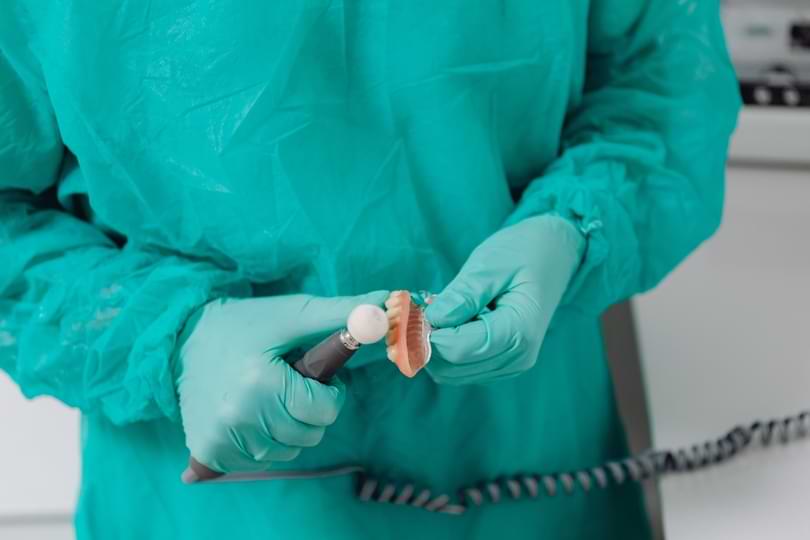
One of the most common concerns patients have when considering dentures is the chance of them falling out during the most embarrassing times, such as public speaking or eating out with family and friends. It doesn’t also help when dentures in pop culture are portrayed as a joke. Fortunately, today’s technology can give us properly fitted dentures that don’t fall out or slip.
What Are Partial Dentures & How Do They Stay Put?
Partial dentures are used to replace teeth when one or more natural teeth remain in the upper or lower jaw. The replacement teeth are usually attached to a gum-coloured plastic base. So, partial dentures for your back teeth will replace only those teeth. A metal framework, or clasps, secures the dentures inside the mouth.
How Should a Partial Denture Fit?
In essence, your partial denture, whether upper or lower, front or back, should fit snugly and comfortably. There should be a tight seal that creates some suction for upper partial dentures, while lower partial dentures rely on an accurate impression having been taken of your teeth to ensure a snug fit. Whether you’re getting upper or lower dentures, getting a good impression of your teeth to create the dentures is extremely important. If your dentures aren’t fitting correctly, for instance they feel too loose or too tight, make sure to speak to your dentist as soon as possible to get them adjusted.
Will Dentures Alter My Appearance?
Dentures are supposed to resemble your natural teeth closely, so there should be only a small noticeable change in appearance. Although, there are also cases where dentures may even improve your smile and fill out your facial appearance.
Will I Have Difficulty Eating With New Dentures?
Getting used to eating with new partial dentures may take a little practice. It can be good to start with soft foods cut into small pieces. Take your time chewing and use both sides of your mouth. While you are getting used to your new dentures, slowly reintroduce other foods until you get back to your regular diet. Remember to be cautious with hot, hard or sticky foods, like chewing gum. Sharp-edged shells or bones that can scratch or break your dentures are a no-no too. Similarly, you should also avoid using toothpicks while wearing dentures.
Will Dentures Affect My Speech?
Initially, you may find it tricky to pronounce certain words. But, if this happens to you, you can practise by repeating difficult words out loud. Over time, you’ll be able to speak easily with your dentures.
How Should a Partial Denture Fit?
They may feel weird or loose initially as your mouth adjusts to them, but partial dentures should fit into place with relative ease. So, never bite down on your partial dentures to force them into position; you’ll only break them. Your dentures will likely be custom made to fit your mouth, and your dentist can make some adjustments to make them sit more comfortably.
Initially, your dentist will advise you to wear your partial dentures all the time, even during sleep, to identify which parts need fine-tuning. This is when you’ll take notes of any discomfort, soreness, irritation and increased saliva production.
How to Tell If Your Dentures Are Loose?
Dentures that slip from your mouth or no longer fit as snugly as before need a fixative, adjustments or to be replaced. When you feel some discomfort or hear any clicking sound when talking, that’s also an indication of loose dentures. Some people also experience minor sores and issues while eating. If you experience any of these, you must go back to the dentist for readjustments.
Are Dentures Worn 24 Hours a Day?
Once the readjustments are made, you should remove your dentures before bed. This allows the gum tissue to rest and be cleansed by your tongue and saliva. Doing so reduces the likelihood of sores and similar issues.
How Do I Look After My Partial Dentures?
You must brush your dentures every day to prevent mouth problems, such as bad breath and gum disease, even if you only have partial upper dentures. Make sure to clean all parts, including the area under the false teeth. Don’t worry; your dentist will brief you on giving your dentures a thorough clean.
The Proper Way to Put On & Take Off Your Dentures
Your dentist will brief you on the correct way to put on and remove your partial dentures once your dentures are ready. But in case you’d need to hear the instructions again, here is some advice from our dental prosthetists.
How to Put On Your Dentures Properly?
Position your denture in your mouth evenly using your fingers and thumbs. The false teeth should be placed above the gap they’re supposed to fill. The clasps should then rest on the natural or abutting teeth. These clasps will have been designed to fit on these teeth.
Press your denture in evenly using your fingers until the clasps slide over the abutting teeth. You will then hear the denture click into place on each side.
This ‘seats’ the denture in place. The clicking noise or sensation should indicate that it’s in position. Your denture should then feel snug and stable. Never force a partial denture into place. If it is inserted correctly, there’s no need to force your denture into place.
If you are having difficulty putting your dentures in, take a moment to make sure they are lined up correctly. If you are still having difficulties, speak with your dentist as soon as possible. Adjustments may need to be made to your dentures.
How to Take Out a Partial Denture Properly?
1. Upper Partial Denture
- To remove your partial upper denture:
- Hook your fingernail or thumbnail at the gum line between your cheek and denture.
- Pull the denture down gently and evenly to release the clasps.
- Carefully remove the denture from your mouth.
2. Lower Partial Denture
- To remove a lower partial denture:
- Hook your fingernails on either side of the denture where it meets your gums.
- Give a gentle wiggle upwards to release it.
- Once the clasps disengage from your teeth, carefully take the denture out of your mouth.
Bring Back Your Smile With Direct Denture Care Now!
Are you looking for an immediate partial denture after extraction? Whether you need partial dentures for your upper, lower, front or back teeth, we’ve got you covered! Call us now to schedule an appointment!











